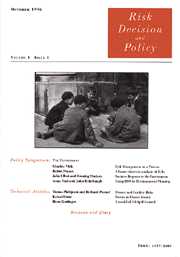Article contents
Imprecise and indeterminate probabilities
Published online by Cambridge University Press: 01 June 2000
Abstract
Bayesian advocates of expected utility maximization use sets of probability distributions to represent very different ideas. Strict Bayesians insist that probability judgment is numerically determinate even though the agent can represent such judgments only in imprecise terms. According to Quasi-Bayesians rational agents may make indeterminate subjective probability judgments. Both kinds of Bayesians require that admissible options maximize expected utility according to some probability distribution. Quasi-Bayesians permit the distribution to vary with the context of choice. Maximalists allow for choices that do not maximize expected utility against any distribution. Maximiners mandate what maximalists allow. This paper defends the quasi-Bayesian view against strict Bayesians, on the one hand, and maximalists and maximiners, on the other.
- Type
- Technical article
- Information
- Copyright
- © Risk, Decision and Policy, 2000
- 7
- Cited by


